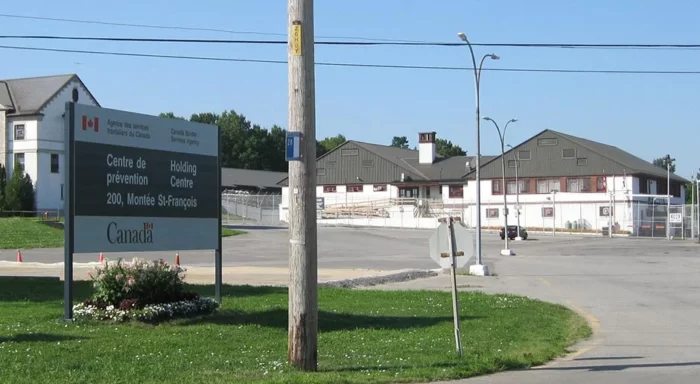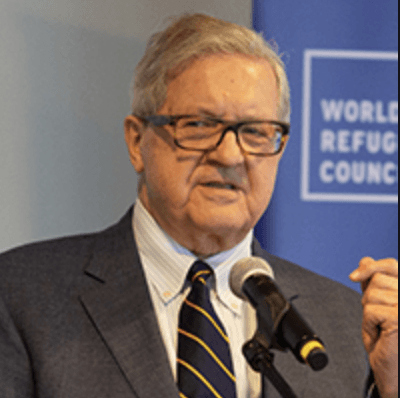Lloyd Axworthy is a former Canadian foreign minister and chair of the World Refugee & Migration Council. Allan Rock is president emeritus of the University of Ottawa and a former Canadian ambassador to the United Nations.
Abdelrahman Elmady arrived at Vancouver International Airport in 2017 filled with hope. A human rights activist from Egypt, he had fled his country, reluctantly leaving his wife and two sons behind, because his life was in danger from the military regime that regarded his activism as a threat.
Mr. Elmady sought asylum in Canada because he felt certain that he would find safety here, in a country that values, promotes and protects human rights. But what Mr. Elmady found on landing in Vancouver was far from what he expected.
He was handcuffed and arrested without charge. His belongings were taken away, including the rechargeable batteries to his hearing aid, which left him in complete silence. He later learned that the Canada Border Services Agency (CBSA) contacted Egyptian authorities and revealed his name, which put his family at risk of reprisals.
After a perfunctory hearing in which he felt unable to participate, Mr. Elmady was transferred to a maximum-security provincial jail where he endured a humiliating strip-search and was housed with individuals awaiting trial on criminal charges. Having no idea how long he would be in custody, Mr. Elmady lost all hope that he would ever be free again. He wondered whether he had made a mistake in coming to Canada at all.
Mr. Elmady was released after two months. Once his case was heard, authorities determined he should not be deported to Egypt. Today, Mr. Elmady continues to live and work in Vancouver. But his first traumatic months in his new country left deep emotional scars and an abiding fear that CBSA may come for him again, to imprison him without reason or recourse.
Mr. Elmady’s experience is all too common. Canadian immigration law allows for the detention of migrants and asylum seekers on administrative grounds, until their case has been decided or they can be deported. CBSA officers have wide discretion to order detention, and they do so disproportionately against people of colour or those with a disability. People are mostly detained on the ground of “flight risk” — that is, the concern that they might not appear at their hearing.
Under agreements between the federal and provincial governments, immigration detainees are held in provincial jails along with those serving sentences or awaiting trial on criminal charges. But immigration detainees are never held on criminal charges or convictions. CBSA allegations against immigration detainees are not tested by a court of law, but instead by a tribunal not bound by legal or technical rules of evidence. There is no legal limit on the duration of immigration detention, so people may be incarcerated without end in sight, including in solitary confinement.
In short, our current laws and practice allow for the arbitrary imprisonment of vulnerable migrants and refugee claimants like Mr. Elmady in deplorable conditions for extended periods without meaningful recourse. This is done in violation of their rights and with complete disregard for the Charter of Rights and Freedoms.
A major report published in 2021 by Human Rights Watch and Amnesty International drew attention to the thousands of migrants and asylum seekers who have languished — some for more than a year — in provincial jails under this appalling practice. The report’s findings shock the conscience. They led to a campaign by human-rights advocates to persuade provincial governments to end their detention agreements with Ottawa. Within one year, four provinces — British Columbia, Nova Scotia, Manitoba and Alberta — have terminated those agreements, and others are reconsidering their position.
Incarcerating migrants and asylum seekers on purely administrative grounds in provincial jails is simply unacceptable. Prime Minister Justin Trudeau’s government should not wait for more provinces to cancel their agreements before finally ending the practice across the country. The government must also immediately establish effective oversight of CBSA and especially of its broad, discretionary power to deprive the liberty of some of the most marginalized people in our communities.
Canada recently announced ambitious immigration targets for the coming years, with as many as 500,000 newcomers to be welcomed annually to help meet our labour needs and to expand our economy. But our border policies must be more than just a numbers game calculated out of self-interest: we must treat all persons who arrive, including those who are fleeing persecution and seeking asylum, with dignity and respect.
Canada earned its global reputation as a defender of human rights after decades of effort by governments of all political stripes. Sadly, that hard-won reputation is now at risk because of CBSA’s arbitrary and inhumane treatment of many migrants and asylum seekers. Now that we know, we must surely act.
Photo: Entrance to the Canadian Border Security Agency’s (CBSA) Laval Immigration Holding Centre in Quebec, Canada. © Wikimedia
This article was originally published by The Globe and Mail [$].


